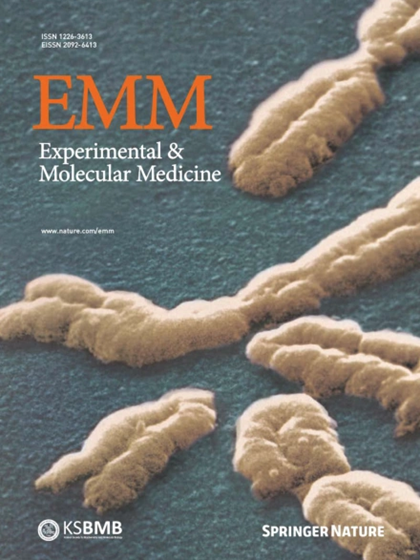Increased oxidative phosphorylation through pyruvate dehydrogenase kinase 2 deficiency ameliorates cartilage degradation in mice with surgically induced osteoarthritis
IF 9.5
2区 医学
Q1 BIOCHEMISTRY & MOLECULAR BIOLOGY
引用次数: 0
Abstract
Chondrocytes can shift their metabolism to oxidative phosphorylation (OxPhos) in the early stages of osteoarthritis (OA), but as the disease progresses, this metabolic adaptation becomes limited and eventually fails, leading to mitochondrial dysfunction and oxidative stress. Here we investigated whether enhancing OxPhos through the inhibition of pyruvate dehydrogenase kinase (PDK) 2 affects the metabolic flexibility of chondrocytes and cartilage degeneration in a surgical model of OA. Among the PDK isoforms, PDK2 expression was increased by IL-1β in vitro and in the articular cartilage of the DMM model in vivo, accompanied by an increase in phosphorylated PDH. Mice lacking PDK2 showed significant resistance to cartilage damage and reduced pain behaviors in the DMM model. PDK2 deficiency partially restored OxPhos in IL-1β-treated chondrocytes, leading to increases in APT and the NAD+/NADH ratio. These metabolic changes were accompanied by a decrease in reactive oxygen species and senescence in chondrocytes, as well as an increase in the expression of antioxidant proteins such as NRF2 and HO-1 after IL-1β treatment. At the signaling level, PDK2 deficiency reduced p38 signaling and maintained AMPK activation without affecting the JNK, mTOR, AKT and NF-κB pathways. p38 MAPK signaling was critically involved in reactive oxygen species production under glycolysis-dominant conditions in chondrocytes. Our study provides a proof of concept for PDK2-mediated metabolic reprogramming toward OxPhos as a new therapeutic strategy for OA. Osteoarthritis is a common joint disease where cartilage breaks down, causing pain and stiffness. Chondrocytes, the cells in cartilage, usually rely on glycolysis for energy production. However, in early OA, they can switch to oxidative phosphorylation as an alternative energy pathway. This study aimed to see if modulating chondrocyte metabolism could slow OA progression. Researchers focused on PDK2, a protein that inactivates PDH, thereby reducing OxPhos activity in chondrocytes. They used mice genetically modified to lack PDK2 and compared them with normal mice with surgically induced OA. They found that, without PDK2, chondrocytes had better energy balance by using OxPhos more effectively and less oxidative stress, which slowed OA progression. This suggests that targeting PDK2 could be a new way to treat OA by improving chondrocyte metabolism. This summary was initially drafted using artificial intelligence, then revised and fact-checked by the author.

通过丙酮酸脱氢酶激酶2缺乏增加氧化磷酸化改善手术诱导的骨关节炎小鼠软骨降解。
在骨关节炎(OA)的早期阶段,软骨细胞可以将其代谢转变为氧化磷酸化(OxPhos),但随着疾病的进展,这种代谢适应变得有限并最终失败,导致线粒体功能障碍和氧化应激。在此,我们研究了通过抑制丙酮酸脱氢酶激酶(PDK) 2来增强OxPhos是否会影响OA手术模型中软骨细胞的代谢灵活性和软骨退变。在PDK亚型中,IL-1β增加了PDK2在体外和体内DMM模型关节软骨中的表达,并伴有磷酸化PDH的增加。缺乏PDK2的小鼠在DMM模型中表现出对软骨损伤的显著抵抗和疼痛行为的减少。PDK2缺乏部分恢复il -1β处理的软骨细胞中的OxPhos,导致APT和NAD+/NADH比值增加。这些代谢变化伴随着活性氧的减少和软骨细胞的衰老,以及IL-1β处理后抗氧化蛋白如NRF2和HO-1的表达增加。在信号水平上,PDK2缺乏降低了p38信号通路,维持了AMPK的激活,而不影响JNK、mTOR、AKT和NF-κB通路。p38 MAPK信号在软骨细胞糖酵解显性条件下参与活性氧的产生。我们的研究为pdk2介导的OxPhos代谢重编程作为OA治疗的新策略提供了概念证明。
本文章由计算机程序翻译,如有差异,请以英文原文为准。
求助全文
约1分钟内获得全文
求助全文
来源期刊

Experimental and Molecular Medicine
医学-生化与分子生物学
CiteScore
19.50
自引率
0.80%
发文量
166
审稿时长
3 months
期刊介绍:
Experimental & Molecular Medicine (EMM) stands as Korea's pioneering biochemistry journal, established in 1964 and rejuvenated in 1996 as an Open Access, fully peer-reviewed international journal. Dedicated to advancing translational research and showcasing recent breakthroughs in the biomedical realm, EMM invites submissions encompassing genetic, molecular, and cellular studies of human physiology and diseases. Emphasizing the correlation between experimental and translational research and enhanced clinical benefits, the journal actively encourages contributions employing specific molecular tools. Welcoming studies that bridge basic discoveries with clinical relevance, alongside articles demonstrating clear in vivo significance and novelty, Experimental & Molecular Medicine proudly serves as an open-access, online-only repository of cutting-edge medical research.
 求助内容:
求助内容: 应助结果提醒方式:
应助结果提醒方式:


